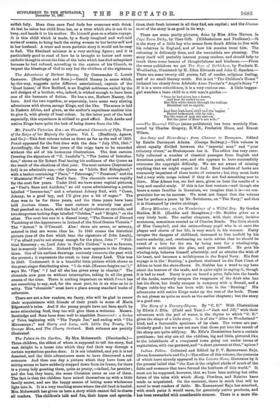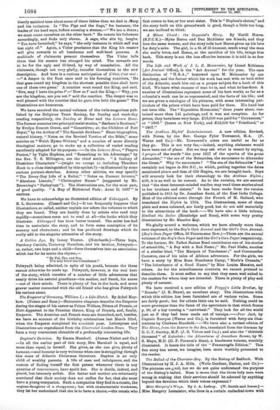Indian Fables. Collected and Edited by P. V. Ramaswami Raja.
(Swan Sonnenschein and Co.)—The editor of this volume, the contents of which have already appeared in the Leisure Hour, illustrates by it the general belief that "the East is the original abode of mach of the fable and romance that have formed the heirloom of this world." It must not be supposed, however, that we have here nothing but older forms of the tales with which sop, Phredros, and Babrins have made us acquainted. On the contrary, there is much that will be novel to most readers of fable. Mr. Benanav/arra Raja has searched, with much pains it would seem, for genuinely native products, and has been rewarded with considerable moms. There is a more die. tinotly satirical tone about some of these fables than we find in Alsop and his imitators. In "The Pigs and the Sage," for instance, the leader of the herd says, before crossing a stream,—" We are a dozen ; we must count ourselves on the other bank." He (mints his followers accordingly, and finds only eleven. A sage, who sits by, laughs. "You have furnished," he says, "the only instance in which self was lost eight of." Again, a Vizier proclaims that the King his master will give rewards to all handsome and well.bred persons. A multitude of claimants present themselves. The Vizier tells them that his master has changed his mind. The rewards are to be for the ugly and ill-bred, by way of consolation. All the claimants, though not very gladly, transfer themselves to the new description. And here is a curious anticipation of Eitat, coot mot —"A despot in the East once said to his fawning courtiers, He that goes round my kingdom in the shortest possible time shall have one of these two gems.' A courtier went round the King, and said, 'Sire, may I have the prize P'—' How so ?' said the King.—. Why, you are the kingdom, are you not ?' said the courtier. The despot was so well pleased with the coartier that he gave him both the gems." The illustrations are humorous.























































 Previous page
Previous page